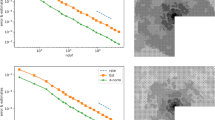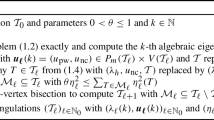Abstract
This paper is devoted to a long standing issue in the finite element analysis for elliptic problems. The standard approach to \( L^2\) bounds uses the \(H^1\) bound in combination to a duality argument, known as Nitsche’s trick, to recover the optimal a priori order of the method. Although this approach makes perfect sense for quasi-uniform meshes, it does not provide the expected information for unstructured meshes since the final estimate involves the maximum mesh size. Babuška and Osborn (Numer Math 34:41–62, 1980), addressed this issue for a one dimensional problem by introducing a technique based on mesh-dependent norms. The key idea was to see the bilinear form posed on two different spaces; equipped with the mesh dependent analogs of \(L^2\) and \(H^2\) and to show that the finite element space is inf-sup stable with respect to these norms. Although this approach is readily extendable to multidimensional setting, the proof of the inf-sup stability with respect to mesh dependent norms is known only in very limited cases. We establish the validity of the inf-sup condition for standard conforming finite element spaces of any polynomial degree under certain restrictions on the mesh variation which however permit unstructured non quasiuniform meshes. As a consequence we derive \(L^2\) estimates for the finite element approximation via quasioptimal bounds and examine related stability properties of the elliptic projection.
Similar content being viewed by others
References
Babuška, I., Osborn, J.: Analysis of finite element methods for second order boundary value problems using mesh dependent norms. Numer. Math. 34, 41–62 (1980)
Babuška, I., Osborn, J., Pitkäranta, J.: Analysis of mixed methods using mesh dependent norms. Math. Comput. 35, 1039–1062 (1980)
Brenner, S.C., Scott, L.R.: The Mathematical Theory of Finite Element Methods. Springer, New York (1994)
Ciarlet, P., Lions, J. (eds.): Finite Element Method (Part 1). Handbook of Numerical Analysis, vol. II. North Holland, Amsterdam (1991)
Demlow, A., Stevenson, R.: Convergence and quasi-optimality of an adaptive finite element method for controlling \(L_2\) errors. Numer. Math. 117, 185–218 (2011)
Eriksson, K.: An adaptive finite element method with efficient maximum norm error control for elliptic problems. Math. Models Methods Appl. Sci. 4, 313–329 (1994)
Eriksson, K., Johnson, C.: Adaptive finite element methods for parabolic problems. II: optimal error estimates in \(L_{\infty } L_{2}\) and \(L_{\infty } L_{\infty }\). SIAM J. Numer. Anal. 32, 706–740 (1995)
Gudi, T.: A new error analysis for discontinuous finite element methods for linear elliptic problems. Math. Comput. 79, 2169–2189 (2010)
Karakashian, O.A., Makridakis, C.G.: Convergence of adaptive algorithms for elliptic problems. Tech. Rep. (2017) (in prepearation)
Karakashian, O.A., Pascal, F.: A posteriori error estimates for a discontinuous Galerkin approximation of second-order elliptic problems. SIAM J. Numer. Anal. 41, 2374–2399 (2003). (electronic)
Makridakis, C.G., Babuška, I.: On the stability of the discontinuous Galerkin method for the heat equation. SIAM J. Numer. Anal. 34, 389–401 (1997)
Morin, P., Siebert, K.G., Veeser, A.: Convergence of finite elements adapted for weaker norms. Applied and Industrial Mathematics in Italy II. Series on Advances in Mathematics for Applied Sciences, vol. 75, pp. 468–479. World Scientific Publication, Hackensack (2007)
Nitsche, J.: Ein Kriterium für die Quasi-Optimalität des Ritzschen Verfahrens. Numer. Math. 11, 346–348 (1968)
Nitsche, J.A., Schatz, A.H.: Interior estimates for Ritz–Galerkin methods. Math. Comput. 28, 937–958 (1974)
Tantardini, F., Veeser, A., Verfürth, R.: Robust localization of the best error with finite elements in the reaction-diffusion norm. Constr. Approx. 42, 313–347 (2015)
Verfürth, R.: A Posteriori Error Estimation Techniques for Finite Element Methods. Numerical Mathematics and Scientific Computation. Oxford University Press, Oxford (2013)
Acknowledgements
The author would like to thank Georgios Akrivis, Manolis Georgoulis, Tristan Pryer and Andreas Veeser for many useful discussions and suggestions regarding this work.
Author information
Authors and Affiliations
Corresponding author
Additional information
Partially supported by the EU Horizon 2020 research and innovation programme under the Marie Skodowska-Curie project ModCompShock (modcompshock.eu) Agreement No 642768.
Rights and permissions
About this article
Cite this article
Makridakis, C.G. On the Babuška–Osborn approach to finite element analysis: \(L^2\) estimates for unstructured meshes. Numer. Math. 139, 831–844 (2018). https://doi.org/10.1007/s00211-018-0955-5
Received:
Revised:
Published:
Issue Date:
DOI: https://doi.org/10.1007/s00211-018-0955-5




